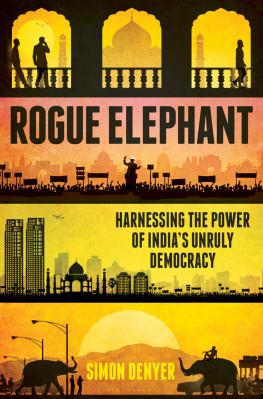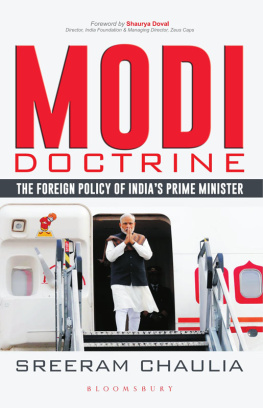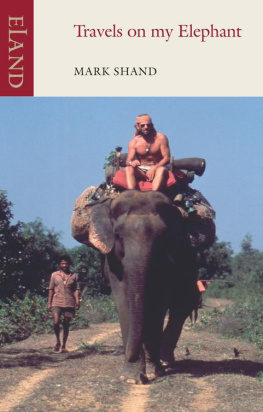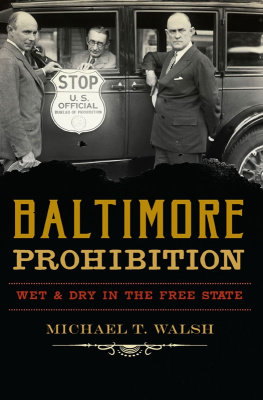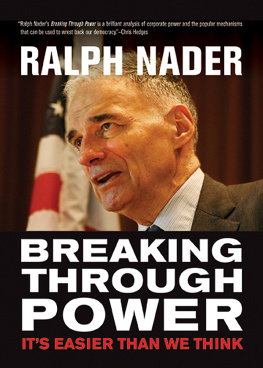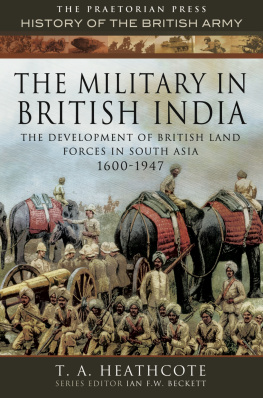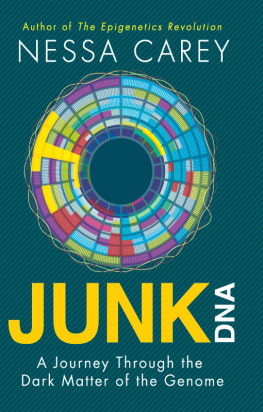Inevitably, a book of this nature draws upon the expertise and insight of very many people. The first person I have to thank is my fantastic Washington Post colleague Rama Lakshmi, whose reporting I draw on extensively in this book. Ramas knowledge and advice were invaluable throughout my second stint in New Delhi, and we spent many hours discussing India and the issues raised here. She also gave me excellent feedback on the first draft of this book. I am grateful to my foreign editor, Douglas Jehl, for giving me time to write while I was also in the process of moving from India to China, and to the entire foreign desk at the Post in DC who helped improve my stories on innumerable occasions. At the Washington Post in India, my researcher and translator Suhasini Raj, office manager Pavitra Gulati, and driver Ashok Pandey were a support team par excellence , while I could never have written this book without our lovely housekeeper Amuda Prakash bringing me endless cups of tea. At Reuters, I want to thank my former assistant Kriti Anand and the entire New Delhi bureau, whose members included some great journalists and very good friends, as well as a team of reporters around the country who accompanied me on many of my trips and provided useful local insight.
This book would never have happened without my agent Patrick Walsh, whose advice, encouragement and good humour helped me turn an initial set of ideas into a coherent proposal. My fabulous editors at Bloomsbury, Bill Swainson and Diya Kar Hazra, then did a first-class job helping me turn a rough-hewn first draft into what I hope is a more polished final product.
I would like to thank everyone who I interviewed in the course of researching this book and during my seven years reporting in India, and who generously welcomed me into their homes and their lives. Some are named in this book, many are not, but to all of them I am grateful.
I have deep admiration for the work of activists whose lives are dedicated to helping the most vulnerable members of Indian society, and I am proud to count some of them as friends. In particular I want to thank and pay tribute to Babloo Loitongbam of Manipur Human Rights Alert, Bhuwan Ribhu of Bachpan Bachao Andolan, and Anjali Gupta, Nikhil Dey and Shekhar Singh of the National Campaign for Peoples Right to Information.
Many others spent considerable time with me over the course my stay in India and to them I owe many of the ideas in this book. There is no room to mention everyone here, but for their time, feedback and thoughts I am especially indebted to: Barun Mitra of the Liberty Institute; M. R. Madhavan and Chakshu Roy at PRS Legislative Research as well as Jagdeep Chhokar and Anil Bairwal of the Alliance for Democratic Reforms, who are all doing fine work to deepen Indian democracy; Zahir Janmohamed, whose own book on Gujarat I am looking forward to; Rajya Sabha member Rajeev Chandrasekhar and Lok Sabha member Baijayant Jay Panda, who are among the most interesting thinkers about Indian democracy operating within the system; Arvind Kejriwal, who is attempting to break in from outside; Ashok Khemka and Sanjeev Chaturvedi, who risked their careers to force through change; Suneeta Tyagi, who welcomed us in Haryana; Arvind Panagariya of Columbia University, Arvind Subramanian of the Peterson Institute for International Economics and Milan Vaishnav of the Carnegie Endowment for International Peace, who are among my favourite observers of India in the United States; historian Ramachandra Guha, whose ideas on democracy inspired me; and Indian Express editor-in-chief Shekhar Gupta and NDTVs Managing Editor Vikram Chandra. I must also mention my debt to the ideas of Pratap Bhanu Mehta of the Centre for Policy Research and to the research of Human Rights Watch, to books by Aarthi Ramachandran, Nilanjan Mukhopadhyay and Patrick French, and to some excellent journalism by reporters at magazines The Caravan and Tehelka .
In particular, I want to thank those people who took the time to tell me their life stories, sometimes dredging up painful memories at considerable emotional cost. Among them were Js father B and her friend Awindra Pandey; Irom Sharmila and her family; Neena Ningombam and the women of EEVFAM in Manipur; Manorama Devis mother Shakhi; Mary (whose real name I have concealed in this book); the women of Haryana; farmers who lost their land; and mothers who lost their children.
My friends Kim Barker, Alex Perry, Gareth Conde, Mark Milton and James Tapper gave me useful help and encouragement at various stages in this books development.
But above all, I want to thank my family, starting with my mum and dad, who are sadly no longer around to see this book but sacrificed a tremendous amount to give me an excellent education and upbringing.
Finally I want to thank my wonderful wife Sarah and lovely daughter Molly, whose love, support and laughter really made this book possible. Without their encouragement and their belief in me, without their patience and understanding, I would have never made it to this point.
Thank you all.
This is a chance for a psychological transformation of society. The peaceful protests expressed a desire for change, as wanting a new order, wanting a new dispensation .
Gopal Subramaniam, member of the Justice Verma Committee set up in the wake of the Delhi gang-rape, speaking to the author, January 2012
At 2.33 and 11 seconds in the morning on Monday 30 July 2012, a power line between two fast-growing cities in northern India tripped, overloaded by excessive demand.
In the twenty-five seconds that followed, the failure cascaded from one transmission station to another across northwestern India, until some 300 million people were left in the dark. Engineers worked to repair the damage, but it was slow going. In the midst of a long, baking hot summer, Indians woke up sweating, as fans and air conditioners failed. Some emerged from their homes in the dark. As dawn broke, many went without showers as electric water pumps failed. The morning commute in the capital turned to gridlock as traffic lights stayed dark, while the gleaming new Metro system, a symbol of Indias modernity, was stalled for hours. Call centres and back office operations on the outskirts of New Delhi closed their doors and sent their employees home. It took fifteen hours to restore 80 per cent of electrical service.
Then, on the 31st, the same line, between Bina and the bigger city of Gwalior, tripped again, at 1 p.m. and 13 seconds exactly. This time the failure had an even more dramatic cascading effect, as power swung through the system looking for a way out. In the next three minutes and five seconds, the official report says, a further sixty-six major power lines tripped. By three and a half minutes past one, the whole of northern India, a vast area ranging some 3,000 km from the Burmese border in the east to the Pakistani border in the west, was without electrical power, with 600 million people cut off. More than 500 trains were brought to a halt, while more than 200 miners were trapped underground for hours. This was the largest blackout in global history.
As the news broke, there was consternation abroad, and not a little amazement. This was supposed to be an emerging Asian power not in the same league as China, perhaps, but the up-and-coming destination of so many Western jobs. India was supposed to be shining, not dark. American business people emailed their Indian counterparts to ask how they were coping. Security consultants in faraway head offices were roused to offer advice to distant countrymen and women in India on how to survive should law and order begin to break down. But this was not New York in 1977, where a blackout in the midst of an economic crisis caused widespread looting, saw thirty-five blocks of Broadway destroyed and thousands of people arrested. This was India in 2012, where people were used to muddling through when the government let them down. There were no protests, no riots, just a weary shrug.
Next page
